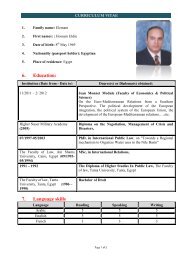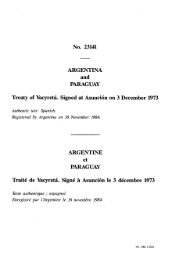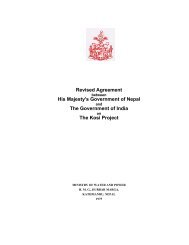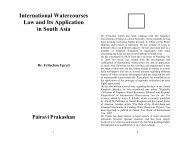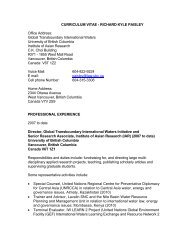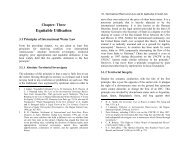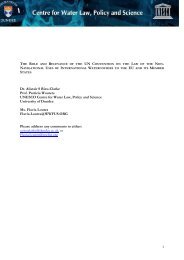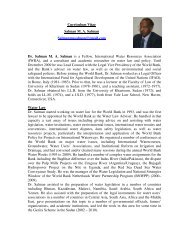Upreti, Trilochan, International Watercourses Law and Its Application ...
Upreti, Trilochan, International Watercourses Law and Its Application ...
Upreti, Trilochan, International Watercourses Law and Its Application ...
Create successful ePaper yourself
Turn your PDF publications into a flip-book with our unique Google optimized e-Paper software.
Equitable Utilisation / 157 158 / <strong>International</strong> <strong>Watercourses</strong> <strong>Law</strong> <strong>and</strong> <strong>Its</strong> <strong>Application</strong> in South Asiadevelopment. Secondly, flexibility was the concern then toensure that there was no hindrance at the time to reaching anagreement, so that the definition <strong>and</strong> broader terms would besorted out later by convention of the parties. Thirdly, there wassufficient reason for states to agree to disagree on thecontroversial issues laid aside for resolution in the future.Fourthly, the use of the term “equity” at UNCED allowedinternational environmental law to integrate more fairly theneeds <strong>and</strong> interests of developing states, particularly theobligation that requires equitable representation within UNbodies or other institutions, or the equitable sharing of benefits.There is no clear-cut definition of equity <strong>and</strong> it has beenconsidered as a sense of fairness <strong>and</strong> justice. From thisperspective, equity does mean greater support <strong>and</strong> co-operationbetween North <strong>and</strong> South in achieving sustainabledevelopment. Such co-operation unequivocally impliestechnological <strong>and</strong> financial co-operation. The whole endeavourof UNCED with respect to North <strong>and</strong> South concentrated ontransferring more aid <strong>and</strong> technology from North to South. 164Moreover, after the increasing advocacy for the NIEO by theSouth, the UNGA has adopted several non-binding documents,such as the 1974 Declaration on the Establishment of the NIEO<strong>and</strong> the Charter on Economic Rights <strong>and</strong> Duties of States(CERDS), as an endorsement of the earlier principle. Bothdocuments set out pre-conditions to the achievement of greaterjustice <strong>and</strong> fairer economic arrangements in the internationalsystem. This was also supported by the ILA 1986 Seoul164 Supra note 26, pp. 108-111. At the special session of the UNGA, theGroup of 77 nations called for discussion on the problems of rawmaterials <strong>and</strong> development, <strong>and</strong> put their case boldly <strong>and</strong> forcefully,accusing the developed nations of creating an unjust, <strong>and</strong> aninconsistent system for them. They passed two resolutions, 3201 <strong>and</strong>3202, containing a declaration <strong>and</strong> programme of action on theestablishment of the New <strong>International</strong> Economic Order, <strong>and</strong> an actionplan to carry out this proposal. It was severely criticised <strong>and</strong> developedstates refused to accept it.Declaration on the progressive development of principles ofpublic international law relating to a New <strong>International</strong>Economic Order. 165The North had earlier agreed to provide 0.7% of their GNP inODA to the developing countries during the Rio Conference1992. In addition to that GEF was restructured (1992) in orderto achieve the target of sustainable development in numerousUNCED documents as a commitment to co-operation. 166 Afterits establishment, the GEF contributed enormously byproviding loans to developing countries. 167 As French hasobserved,“the use of equity in environmental agreements <strong>and</strong>soft law instruments reflects a broader attempt by theinternational community to incorporate the interests ofdeveloping states into environmental law <strong>and</strong> policy.The introduction of differential st<strong>and</strong>ards betweendeveloped <strong>and</strong> developing states, <strong>and</strong> the provision offinancial <strong>and</strong> technological assistance, are otherexamples of the same trend". 168In a broader sense, the words “equity” <strong>and</strong> “equitable” assist inensuring equality in achieving the same levels of development<strong>and</strong> prosperity to all people in the developing states as areenjoyed by the people of the developed states. The main basisfor this is that environmental sustainability required primeconsideration to secure the rights of future generations as wellas of the present generation. In order to reduce the disparitybetween North <strong>and</strong> South in terms of living st<strong>and</strong>ards <strong>and</strong>provision of basic amenities of life, the interpretation of equity165 Ibid. p. 112-130.166 Supra note 159, p. 739.167 Ibid. p 737 - 40% to biodiversity, 40-50% to global warning, <strong>and</strong> 10-20% to fresh water resources have been allocated.168 D. French, “Developing States <strong>and</strong> <strong>International</strong> Environmental <strong>Law</strong>:The Importance of Differentiated Responsibility” (2000) 49 ICLQ, pp.35-60.



